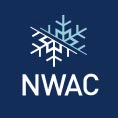Avalanche Forecast
Issued: Feb 17th, 2015 10:00AM
The alpine rating is , the treeline rating is , and the below treeline rating is
Low avalanche danger is expected in all elevation bands on Wednesday.
Summary
Detailed Forecast
A weak front will approach the area on Wednesday with an increase in high clouds beginning overnight. There should be a gradual cooling trend through the day, but an increase in clouds overnight and warm temperatures could inhibit a good re-freeze.
On Wednesday, small loose wet avalanches will be unlikely and only potentially found in isolated areas near and below treeline. Due to the low likelihood of triggering and small size, loose wet avalanches will not be listed as a problem.
As a result of the overall low snowpack, especially below treeline, watch for terrain hazards such as open creeks, partially covered rocks and vegetation.
Snowpack Discussion
Warm and wet southwest flow directed a series of fronts across the Northwest from about February 5th-10th, producing a mix of rain and wet snow along the east slopes. Since then, a benign weather pattern with mild temperatures has set in. Sites in the northeast Cascades that received the most snow during the last storm cycle, such as Washington and Harts Pass, have seen over a foot of settlement over the last week.
NWAC pro-observer Jeff Ward has been at Hart's Pass the late last week and reported overnight refreezing of surface snow followed by small ski triggered loose wet avalanches on solar slopes. NWAC pro-observer Tom Curtis was on Labyrinth Mountain up the Little Wenatchee drainage on Saturday and found a no signs of instability and little snow on south slopes below 5000 feet.
Tuesday featured sunny skies and generally mild temperatures that may have allowed for small wet loose avalanches on steeper solar slopes.
While the January 15th facet/crust interface can still be identified in parts of the NE Cascades, this PWL has been stabilizing and become unlikely to trigger. As a result the Persistent Slab problem has been removed from the NE Cascade forecast.
Valid until: Feb 18th, 2015 10:00AM
